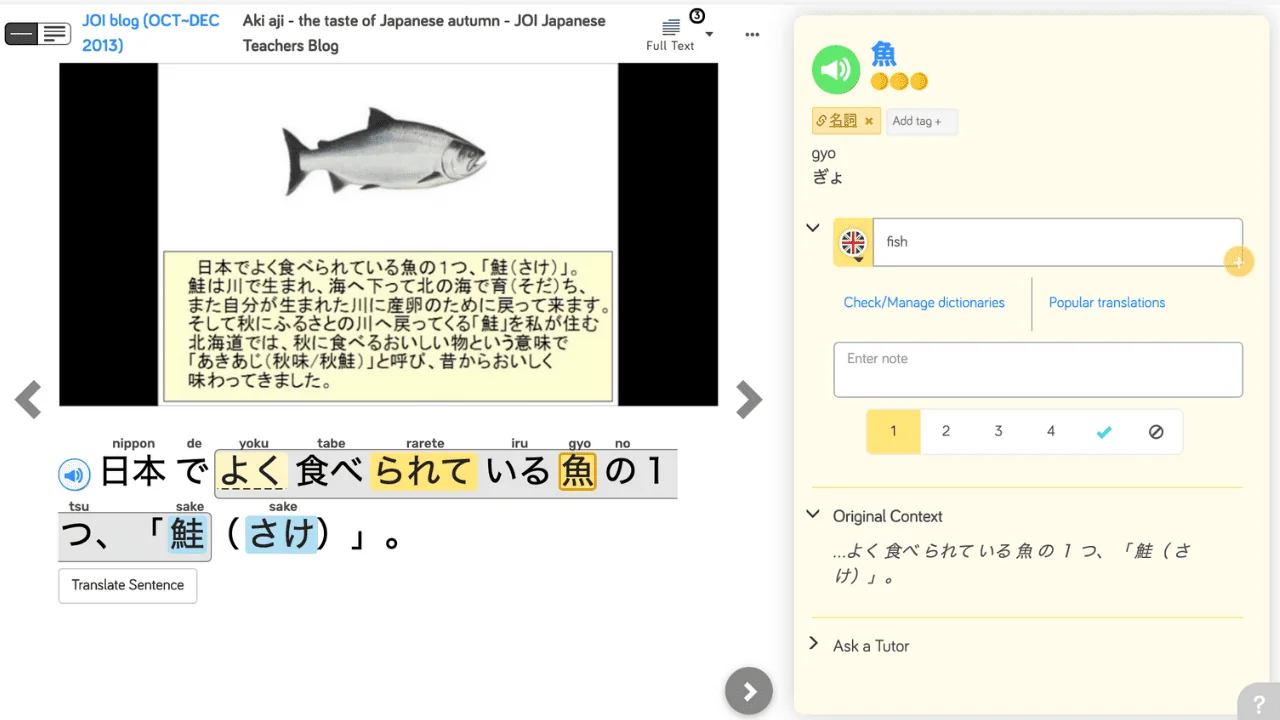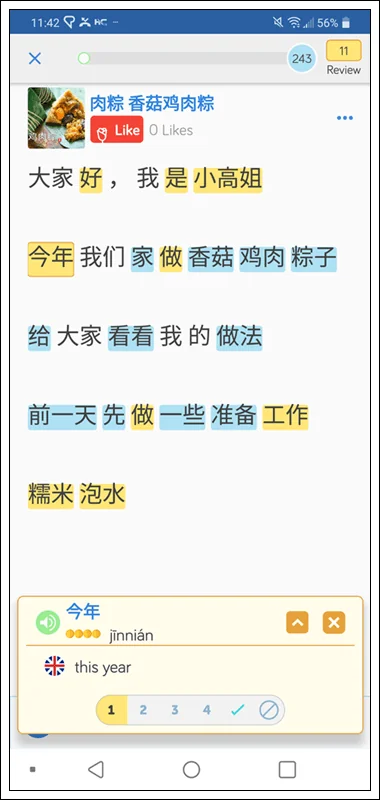The Best Way To Learn Japanese
I started learning Japanese a little over three years ago. Since then I’ve used over a dozen books, several well-known courses, and more techniques than I care to remember. Fortunately for my studies (and my sanity), I discovered LingQ half way through and have been using it ever since.
Today I’d like to share with you the best way to learn Japanese based on four essential elements that everyone can use. In addition to that, I’m going to explain how using LingQ makes it easy to combine all of them together into one comprehensive system. Let’s begin!
Elements 1 + 2: Reading and Listening (Combine Them)
The first two elements are reading and listening, but with a twist: combine them! To be more specific, when I say “combine reading and listening” I don’t mean doing both activities at the exact same time, although you can do that and I’ve found that it works. But what I really mean is what the co-founder of LingQ Steve Kaufmann said in one of his YouTube videos that you should “listen to whatever you read, and read whatever you listen to.” A question we frequently get asked is “is it hard to learn Japanese“? Watch the following video for Steve’s opinion on the matter.
Going over the same material multiple times in alternative forms like this helps reinforce the new words and phrases while improving both reading and listening comprehension. What I’ve found from my own experience is that it’s easier to learn a new word when reading it, but by also listening to it I can hear the emotions and feelings of the speaker. Sometimes this reveals hidden meanings such as frustration or excitement that I missed in the text alone.
LingQ is set up perfectly for listening to and reading the same material easily. When reading the Japanese on the page, you can click on the big, blue play button in the top left corner to hear a native read the text. If the entire page is a little too much, then you can change it over to sentence mode which allows you to read and listen to a single line at a time. Or If there is just one word that’s giving you trouble, you can also click on it and the text to speech will let you hear it.
Element 3: Learn From Native Materials
The third element is using native materials. When you’re first starting out with Japanese, it’s perfectly fine to learn from a beginner book. However, once you’ve got a grasp on how the language works, I’ve found that it’s best to read and listen to things that are “made by Japanese people, for Japanese people.” I think there are two reasons why this is so powerful.

The first reason is because, as Steve has said before, “the native is the model we want to emulate” when learning Japanese. The native materials you read will be grammatically correct and sound natural. And when you listen to Japanese people talking, you will hear correct pronunciation which you can then mimic yourself. By learning from native materials, the Japanese you use will be easy for Japanese people to understand and you will avoid awkward sounding sentences.
The other reason is simply one of volume. There are infinitely more Japanese books, shows, and articles that are created for Japanese people to consume and enjoy than there are for people to learn Japanese. This means that you have a much bigger library of material to choose from when you select native materials. Thankfully LingQ has you covered on this part as well. There are hundreds of lessons on LingQ that are taken from native Japanese sources such as news articles, blogs, novels, and more!
Element 4: Choose Things That Excite You

The final element is learning from exciting or interesting material. The truth is, learning Japanese takes a long time and a lot of work. But if you are learning the language through the things that you love, then it actually doesn’t feel like work. It feels like fun!
There are two things that I’ve noticed when I learn from exciting shows and books. The first is that it makes me even more motivated to spend time with the language, which then leads to improvement. The other thing is that I’m not focused on learning the Japanese words, but rather on understanding the story that’s told through the words. This then leads to what Steve calls “incidental learning” where you don’t even remember how you learned the words, because you acquired them naturally.
LingQ lets me do this through their importing feature where I can upload any Japanese book, anime, video, or other material that I can get my hands on. Sometimes I’ll use a great anime like My Hero Academia to learn Japanese, and other times it’s a fun book like Harry Potter. No matter what I learn from, it’s something that I would read or watch in my native language because I’m genuinely interested in it. LingQ allows me to have fun like I normally would and improve my Japanese at the same time.
Learn Japanese Faster Using LingQ
Immersing yourself in Japanese doesn’t require you to travel abroad or sign up for an expensive language program. However, it can be a bit tiresome to find interesting content, go back and forth between sites, use different dictionaries to look up words, and so on. That’s why there’s LingQ. A language app that helps you discover and learn from content you love.
You can import videos, podcasts, and much more and turn them into interactive lessons. Keep all your favourite Japanese content stored in one place, easily look up new words, save vocabulary, and review. Check out our guide to importing content into LingQ for more information.

LingQ is available for desktop as well as Android and iOS. Gain access to thousands of hours of audio and transcripts and begin your journey to fluency today.
Enjoyed this post? Check out polyglot and LingQ cofounder Steve Kaufmann’s blog post to learn about the similarities and differences between learning Korean vs Japanese!
***
Nick Hoyt is an MBA student with an emphasis in International Business. He’s been learning Japanese for three years, half of that time with LingQ, and aspires to one day work and live in Japan.


